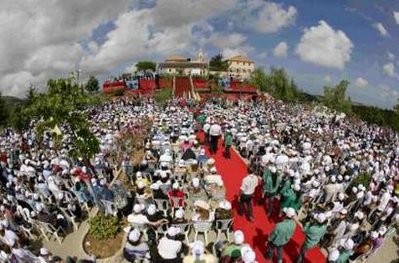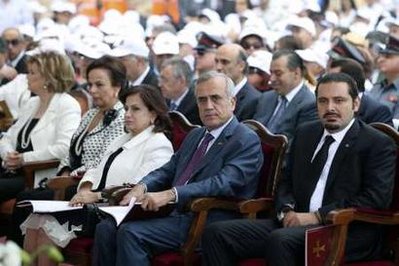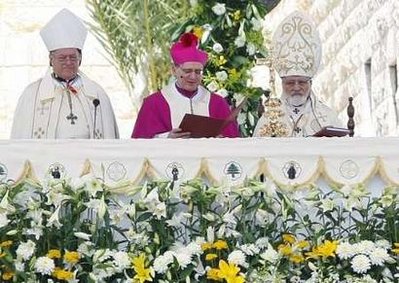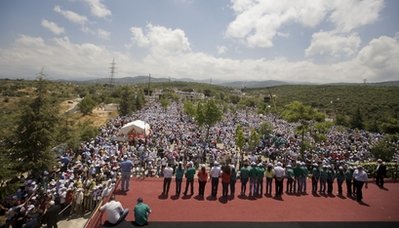Stephen Nehmé (born Joseph) was known for his constant awareness of God’s presence in his life. He was born in March 1889 in the town of Lehfed, in the Jbeil district, as the youngest of seven children. In 1905, two years after his father’s death, Nehmé entered the novitiate of the Order of Maronites, in the Monastery of Sts. Cyprian and Justina in Kfifan. On Aug. 23, 1907, he made his monastic vows, taking the name Stephen after the patron saint of his birthplace. Father Nehmé died Aug. 30, 1938, at the age of 49, of natural causes and was buried in the monastery at Kfifan, where his body remains intact.
Batroun: Lebanese Maronite monk Estephan Nehmeh was beatified by the Vatican on Sunday as thousands of the faithful gathered outside the Monastery of Kfifan in the mounatains of the northern district of Batroun.
Archbishop Angelo Amato, special envoy of Pope Benedict XVI, read the papal decree bestowing the title of “blessed” on Estephan Nehmeh (1889-1938), who devoted his life to “meditative prayer and unlimited service to the poorest.”
The beatification of the monk was approved after doctors appointed by the Holy See in 2007 certified the “miraculous” cure of his niece, Sister Marina, from cancer.
The bedridden Sister Marina, 95, attended Sunday’s ceremony. Sick for 30 years, it was she who prayed to her dead uncle to intercede for her.
Maronite Patriarch Nasrallah Sfeir presided over the ceremony at the Saint Justine and Saint Cyprien monastery in Kfifan, where Nehmeh’s mummified body was on display in a glass coffin.
President Michel Sleiman, who is also a Maronite, and Prime Minister Saad Hariri, a Sunni Muslim, attended, along with other political figures and a huge crowd estimated by the organizers at thousands.
“We are happy with saints that lived among us and equally to us on this land but our happiness becomes overwhelming if we follow their path and become like them,” Sfeir told the crowds.
Kfifan is also the home of Saint Nehmtallah Hardini while the neighboring monastery of Jrebta is home to Saint Rafqa.
Since the early hours of the morning, roads to Kfifan were packed with cars and buses transporting believers to the location as thousands parked miles away from the monastery to take the journey on foot.
Triumph arcs, Lebanese flags and slogans welcoming the patriarch and hailing Nehmeh were lifted in the mountainous towns leading to Kfifan.
Marches to the monastery started Saturday night from nearby towns and villages and Nehmeh’s hometown Lehfed.
Among the faithful who attended the ceremony, expatriates from Australia, Canada, the US, Europe and Mexico came to participate in the beatification of Nehmeh.
The Internal Security Forces and the Lebanese Army deployed all along the road from Beirut to Kfifan and secured the monastery’s parameters as participants were searched before being allowed entry to participate in the ceremony.
Giant screens were also erected in the monastery’s yard to allow the crowds to follow-up with the ceremony as the faithful voiced prayers.
At the opening of the Mass, Sfeir asked the papal delegate permission before beatifying Nehmeh. “The Maronite Church and the Order of Lebanese Monks asked the Holy Pope Benedict XVI to beatify Lebanese Maronite Monk Estephan Nehmeh,” Sfeir said.
“We are happy to welcome you as the pope’s envoy to head in his name the ceremony to beatify monk Estephan Nehmeh. This occasion is a very joyful one for Lebanon and particularly the Maronite community despite the country’s small size and population,” he added.
For his part, Amato highlighted Lebanon’s importance from a religious and historic perspective as a sanctuary for Christianity given the dynamic role of the Christian community and the large number of religious sites.
“We should be grateful to Pope Benedict XVI for his gift to the Lebanese people through the beatification of brother Estephan since this is a new page of sanctity that is added to the bright pages that Saint Charbel, Sainte Rafqa and Saint Neamtallah Hardini drew,” Amato said.
“We should follow the path of faith, love and sacrifice of Estephan and practice our faith and seek perfection similarly to the Cedars of Lebanon,” Amato said.
Meanwhile, head of the Lebanese Order of Maronite Monks Elias Khalife said Nehmeh represented the humanitarian and Christian values of the Maronite Church.
Khalife also hailed the Maronite patriarch, Sleiman and Hariri who attended the ceremony “that made Lebanese Christians and Muslims happy.”







